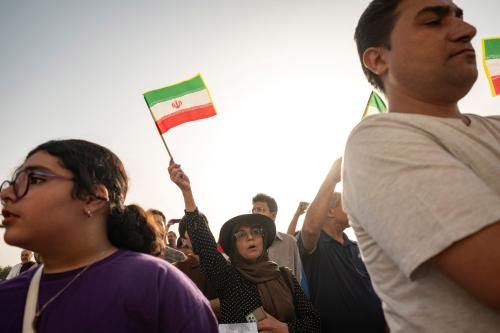On the topic of Iran’s nuclear dispute, perhaps the most interesting read this week is an open letter from 55 prominent Iranian political prisoners past and president, urging President Obama to respond to Iran’s election of Hassan Rouhani with sanctions relief. The virtual “Who’s Who” of high-profile dissidents and political figures, including names like Mohsen Mirdamadi, Mostafa Tajzadeh, and Faezeh Hashemi, argued that the sanctions are a humanitarian disaster and are deeply counterproductive, and deepening them, as the House voted to do last week, will backfire by making Iranians see Washington as arbitrarily aggressive. The letter was put in context in various outlets, including the Financial Times.
In the National Interest, Paul Pillar argued that the West could benefit from better understanding Iran’s exasperation in the nuclear issue, particularly since, he argues, it doesn’t seem that anything Iran is known to be doing is technically in violation of the Non-Proliferation Treaty. In the same publication, Greg Thielmann wrote that a letter penned by Robert Menendez and Lindsey Graham and signed by 74 other senators, which urges Obama to intensify pressure on Iran, could squander any hope that Rouhani’s election could lead to new progress in negotiations. In the Daily Star, Rami Khouri put it more bluntly, saying that the cold reception Washington is giving the Rouhani administration shows that America is quite simply acting like “a jerk” instead of embracing the opportunity the new administration in Tehran offers. Meanwhile, Real Clear World asked seven Middle East observers if they thought any type of military strike by the United States could become a reality.
The announcement of Rouhani’s cabinet nominees has predictably prompted much reaction. Ali Reza Eshraghi wrote in CNN that the decision by Rouhani to emphasize experience in his cabinet selections heralds a return to a pragmatic old guard after a “chaotic” eight years of Ahmadinejad. In Time, Ishan Tharoor looked at the prospects for America’s favorite Iranian diplomat, the U.S.-educated former UN ambassador Mohammad Javad Zarif, to mend Iran’s relationship with Washington as foreign minister. Tehran Bureau profiled the choice for minister of culture and Islamic guidance, Ali Jannati, pointing out how much he differs from his famous hardliner father, Guardian Council head Ayatollah Ahmad Jannati. Some names on the cabinet list drew angry reactions from advocacy groups, however; Human Rights Watch and the International Campaign for Human Rights in Iran urged Rouhani to withdraw his nomination as justice minister, Mostafa Pour-Mohammadi, due to his alleged role in killings of dissidents in the 1980s and 1990s.
Turning our attention to Israel, the Times of Israel interviewed former Knesset member and nuclear official Uzi Even, who discussed and compared the Iranian and Iraqi nuclear programs in depth and argued that if Iran wants to build a bomb it can deploy with any effectiveness, it remains years away from this goal. In the National Interest, John Allen Gay argued that Israel’s task of whipping up international opinion against Iran has become much harder now that Mahmoud Ahmadinejad has left office, and provided a retrospective look at some of the former president’s most provocative moments.
In new media this week, Small Media released a look at the mixed reactions to Rouhani’s victory from conservative Iranian bloggers, while Mahdi Taghizadeh mused on the increasing importance given to Twitter in Iran in the aftermath of Rouhani’s extensive use of the platform during the campaign, despite the fact that accessing Twitter is still technically prohibited in Iran.
And in cinema, following up on a film discussed in this space before, Manohla Dargis of the New York Times has just reviewed Mohsen Makhmalbaf’s The Gardener – opening today in New York – which got the esteemed director and former revolutionary bashed by many in Iran due to his decision to film in Israel and attend the Jerusalem Film Festival for its premiere.
Enjoy the reads and the weekend!
The Brookings Institution is committed to quality, independence, and impact.
We are supported by a diverse array of funders. In line with our values and policies, each Brookings publication represents the sole views of its author(s).




Commentary
What to Read on Iran this Week: Gauging the Cabinet Picks and America’s Response to Rouhani’s Inauguration
August 9, 2013